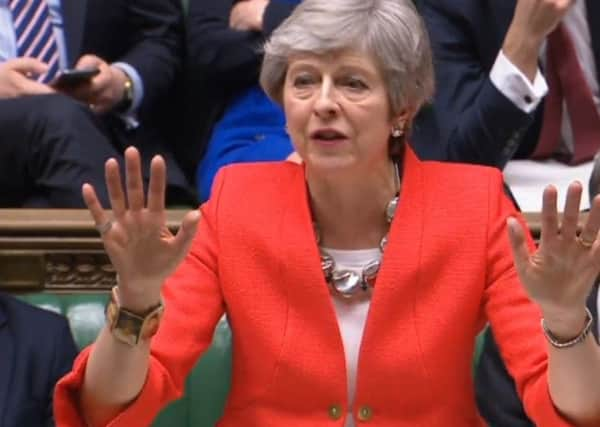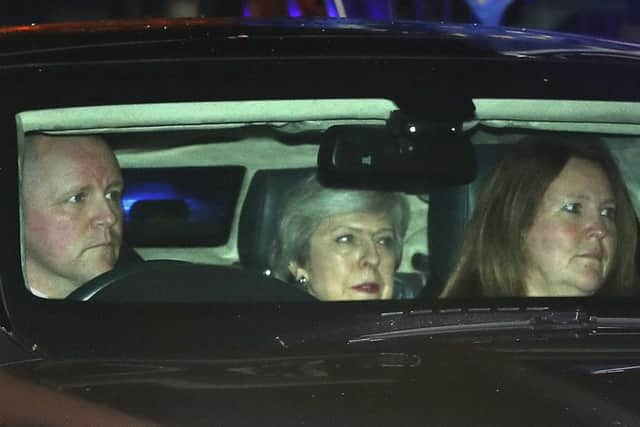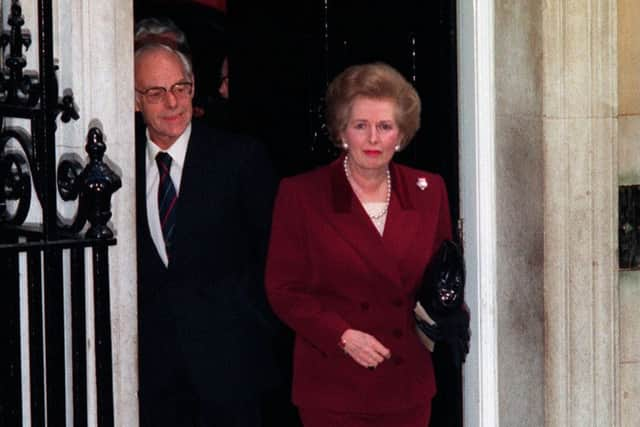Jayne Dowle: We will wake up with a government but no idea what it stands for as Brexit engulfs Theresa May at this moment of history


Think about the day that Margaret Thatcher left Downing Street for the last time in 1990, tears welling in her eyes as she was driven away.
Bring to mind Black Wednesday two years later when the pound was devalued to such an extent that Britain was forced to withdraw from the ERM (European Exchange Rate Mechanism) and men wept openly on Westminster Bridge.


Advertisement
Hide AdAdvertisement
Hide AdA moment in history isn’t supposed to feel like a long, slow descent down a lift shaft; but this is how it feels to live through the consequences of the EU referendum. We wake up with a government, but we have no idea what it stands for. With Prime Minister Theresa May clinging on for grim death at the helm, it is like watching a ship battle waves so thunderous and huge they threaten to engulf the entire country and submerge us once and for all. Was ever the stormy and destructive weather this week so reflective of an entire nation’s state of mind?
We consider the alternatives to her leadership and find them sadly lacking. Jeremy Hunt? He lacks the gravitas and could be an AI robot in a suit as far as many members of the public are concerned. Sajid Javid? He’s a strong media performer and opinionated, but would most likely bring division when, above all, unity is required. And let’s not forget that pushing for the resignation of Theresa May brings with it yet more contention; this would be the second subsequently unelected Prime Minister in a row. No country which calls itself a democracy should be expected to tolerate that.
A general election then? This would be the least-favourable option when we need to keep as tight a grasp on stability as humanly possible.


Advertisement
Hide AdAdvertisement
Hide AdEspecially as the outcome could be worse. We look to Her Majesty’s Opposition and see a leader who has, until recently, kept his view on how we should implement the majority decision of the country to leave the EU to himself and his close advisers.
What Jeremy Corbyn should have been doing these past two years is tackling some of the reasons why so many Labour voters felt that their concerns about immigration and jobs were being over-ridden to such an extent that the only option they could see in front of them was ‘‘Leave’’.
At the same time, he should have also encompassed the concerns of many other Labour voters whose natural inclination, in the interests of international understanding and tolerance, is to stay in the European Union. Instead, he has sought to make political capital out of all this uncertainty by opening up yet more fissures on several fronts, sowing dissent and despair among Labour MPs, several of whom have now left the party.
In place of a clear and straight path, the past two years have been a series of ‘‘ifs’’ and ‘‘buts’’, served with a huge dose of cowardice (on the part of subsequent Brexit ministers who have put self-interest before the country’s good), grand condescension (from the European Research Group, led by arch-Brexiteer, Jacob Rees-Mogg) and downright political opportunism (you know who you are).
Advertisement
Hide AdAdvertisement
Hide AdWhat are we ordinary people to make of this so-called great moment in history? Despite what every television news crew thinks, we’re not ‘‘sick of hearing about Brexit’’. We’re concerned, frightened, anxious and worried what on earth might happen next.
It is not just the big issues, like passports and freedom to travel, although we remarked the other day in our house that we’re pleased – and a little wistful – that we took advantage of unfettered travel by train around France last year on our family holiday.
It is also the little things, or not so little in the case of the drop in value of my modest private pension fund carefully squirrelled away over the years. It has somehow lost two thousand pounds in the last financial quarter. When I queried this perturbing figure with my financial adviser, his answer was inevitable: “The markets are volatile, blame Brexit.”
And for the first time this week, I thought about stockpiling food. I was looking for tinned new potatoes – for a meat and potato pie, don’t judge, it works – and found none in two usually-reliable supermarkets. The assistant in the second store told me that there was a shortage. Was it my imagination, or did all the shelves where tinned goods usually sit look oddly bare? It struck me that yes, fear does breed an unnerving sense of paranoia.
Advertisement
Hide AdAdvertisement
Hide AdIt is often said that we should be careful what we wish for. The intention of many who voted to leave the European Union was that Britain would become an independent country free of the shackles of Brussels.
Unless a miracle occurs between now and the end of the month, that is exactly what we will be. Cast adrift, with no useful trade agreements in place and no idea of where we are going next. If this really is a moment in history, it is not one we will want to remember.